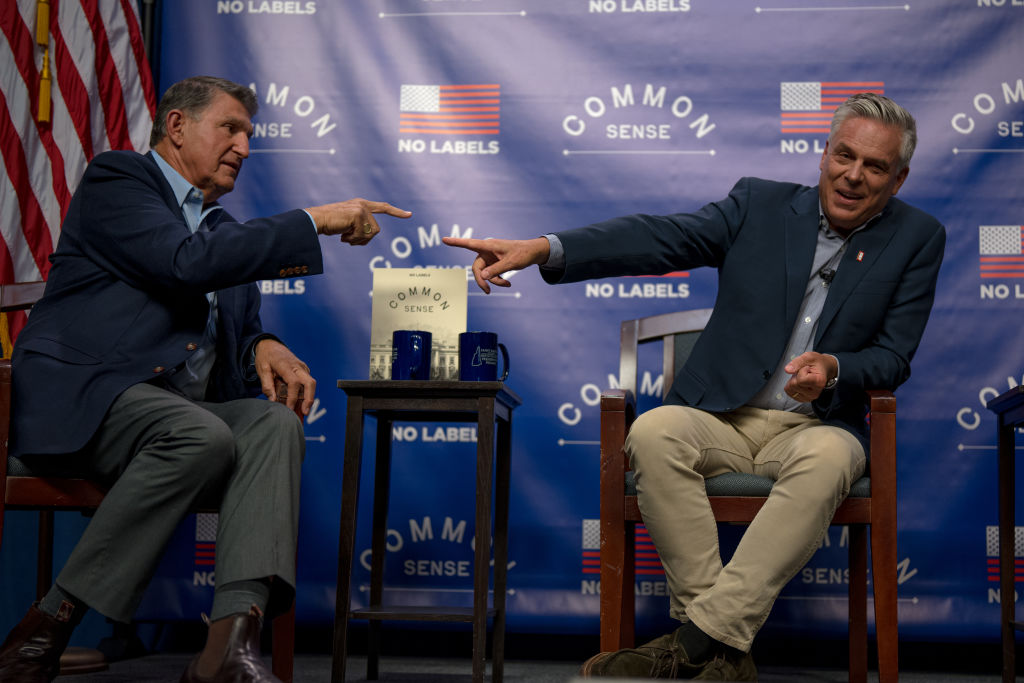Earlier this year, No Labels made waves when it signaled it would seek to nominate an independent presidential candidate in 2024 who could face off against President Joe Biden and Republican frontrunner Donald Trump. But the nonpartisan organization has pumped the brakes on elements of its effort in recent months, with top officials reassessing their strategy for selecting and nominating candidates.
No Labels, a 501(c)(4) founded in 2010 to foster bipartisanship in Washington, has not slowed its effort to recruit candidates to run for president and vice president on a unity ticket. And there has been some reciprocal interest from targeted recruits, sources close to No Labels emphasize—especially as it seems more certain Biden and Trump will lead next fall’s Democratic and Republican tickets, respectively. But these sources also acknowledge the group has been forced to backtrack on—or at least delay—key components of an ambitious plan intended to pave the way toward nominating a 2024 White House slate.
Sources blame the hiccups on fresh resistance from inside No Labels to previously agreed upon steps the group was to take toward potential candidate nominations—plus disorganization and unforeseen logistical challenges. “Deadlines have slipped, discussions have continued,” an individual close to the group told The Dispatch, requesting anonymity to speak candidly. “Nobody’s done this—these are talented people but they’ve never done anything like this. I haven’t either.”
Two weeks ago, No Labels canceled its in-person nominating convention scheduled for mid-April in Dallas, opting instead for a virtual gathering.
The group had touted the real-world convention for months, saying it would be filled with grassroots No Labels members and occur regardless of whether the nomination of a ticket was pursued. Sources, however, said that No Labels officials began to balk at the high cost associated with such an event. There were also concerns that holding an in-person convention would constrain the group’s flexibility on the timing of a potential candidate selection. If, for example, No Labels wanted to move quickly to nominate a ticket, a rigidly scheduled convention could delay the process unnecessarily.
Last month’s announcement wasn’t the first time No Labels has backed away from a previous commitment. Indeed, No Labels chief strategist Ryan Clancy said just after Labor Day the group was working to establish ground rules for choosing nominees and would make them public sometime in October. “We really wanted to prioritize this selection aspect of this,” Clancy told The Dispatch in early September. October came and went, as did November and half of December, with no update on this process from No Labels.
Clancy also told The Dispatch in early April that No Labels was planning to accelerate candidate vetting in late summer or early fall. By September, however, he conceded the group might have gotten ahead of itself and was instead focused on devising and agreeing upon the candidate nominating process. And three months after that, candidate vetting still remains on hold as No Labels endeavors to lure high-profile candidates capable of coalescing broad voter support and winning a national election against the two major political parties.
“There’s more of a demand and more of an opportunity for this idea than ever before. However, I think the organization has had some stumbles,” a second knowledgeable source said. “They haven’t been quite ready for prime time. It’s moving too fast—too quickly—and they weren’t prepared.”
“Rather than waiting till they have all their ducks lined up, they go out and say things like: ‘We’re going to have this process.’ And, there’s lots of disagreement about the process,” this source added. “Well, maybe we shouldn’t do that. They really should just be focused on gaining access to the ballot and figuring out the messaging.”
During a Thursday afternoon telephone call, Clancy told The Dispatch No Labels was simply being nimble, making changes to its approach in order to preserve organizational and strategic flexibility the group believes is essential to fielding a viable White House ticket in such an unorthodox manner. This priority, Clancy explained, is why the group altered its convention. Reversing course on plans to establish and publicize its nominating procedure was also done to maintain tighter, internal control over candidate selection. “We are willing to turn on a dime,” Clancy said. “This is about flexibility.”
An aspect of No Labels planning that has continued apace is the group’s $70 million effort to secure a presidential ballot line in every state—34 by its count—in which the law allows for it. As of this week, the group has secured ballot lines in 12 states, with Clancy saying that by New Year’s Eve, No Labels will be actively taking steps to earn ballot lines in an additional 15 states.
Polls show voters are extremely dissatisfied with the prospect of a Biden-Trump rematch, creating a political opening for a No Labels ticket if the organization can effect its plan. Clancy said No Labels’ latest data modeling of the national electorate, conducted since December 1, shows similar exasperation, with 83 million voters claiming they would either “definitely support” or “consider supporting” a unity ticket—up from 77 million earlier this year. According to Clancy, the group’s voter modeling also showed a unity ticket featuring generic Democratic and Republican candidates roughly tied with Biden and Trump in a three-way race.
Discussions with potential candidates for the Democrat-Republican (or Republican-Democrat) ticket No Labels envisions also remain robust. Clancy said he expects top-tier potential candidates to be more willing to engage with the group in mid-March, once it becomes more obviously apparent that Biden and Trump are headed for a rematch.
Still, No Labels’ candidate recruitment is not without its challenges.
The organization is targeting people of prominence—in business, in politics, and with military backgrounds—and asking them to trust an untested strategy and run for president and vice president in a way that’s never been done before. Particularly among viable Democrats and Republicans the group is eyeing—including some currently running for president—there is a reluctance to risk future career prospects.
Wooing potential candidates has been made doubly difficult by two additional factors: No Labels has yet to secure ballot lines in all states where doing so is lawfully permitted due in part to various lawsuits, and the group might ultimately opt against elevating a White House ticket at all, should Biden, Trump, or both, not lead their parties into the general election.
“We have to make sure we pick the right candidate,” a third dialed-in source said. “Our major goal is to get on the ballot. We have to assure major candidates we can do that.”









Please note that we at The Dispatch hold ourselves, our work, and our commenters to a higher standard than other places on the internet. We welcome comments that foster genuine debate or discussion—including comments critical of us or our work—but responses that include ad hominem attacks on fellow Dispatch members or are intended to stoke fear and anger may be moderated.